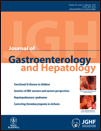Nucleotide oligomerization domain 2 polymorphisms in patients with intestinal failure
Abstract
Background
Nucleotide oligomerization domain 2 (NOD2) has been associated with intestinal immunity after the discovery that its polymorphisms are linked to Crohn's disease (CD). Intestinal failure (IF) represents a wider spectrum of diseases where intestinal homeostasis has been disrupted.
Aim
To evaluate the prevalence of NOD2 mutations in a population with IF as well as its association with the different conditions causing this problem.
Methods
One hundred ninety-two consecutive patients with IF and 103 healthy controls were genotyped for the three most common NOD2 polymorphisms. Genotypes were compared between the groups and were related to the entities causing IF.
Results
A high percentage (26%) of patients had at least one of the three most common NOD2 polymorphisms, while only a 4.8% of healthy controls had a mutant genotype. In patients with IF, specific mutations for the 702W, 908R and 1007fs alleles were 11, 5 and 12.5%, respectively, compared with 0.9% (P = 0.0003), 1.9% (P = 0.1) and 1.9% (P = 0.001) in the control group. If we consider patients with any cause of IF other than CD, the percentage is still as high as 18.8%, with specific mutation frequencies of 7.6% (702W; P = 0.01), 5.8% (908R; P = 0.1) and 8.2% (1007fs; P = 0.002). We could not establish an association between a NOD2 mutant genotype with any other specific clinical condition other than CD.
Conclusion
Our finding supports the importance of NOD2 in the maintenance of intestinal immune homeostasis and may be important to a variety of intestinal stressors.




